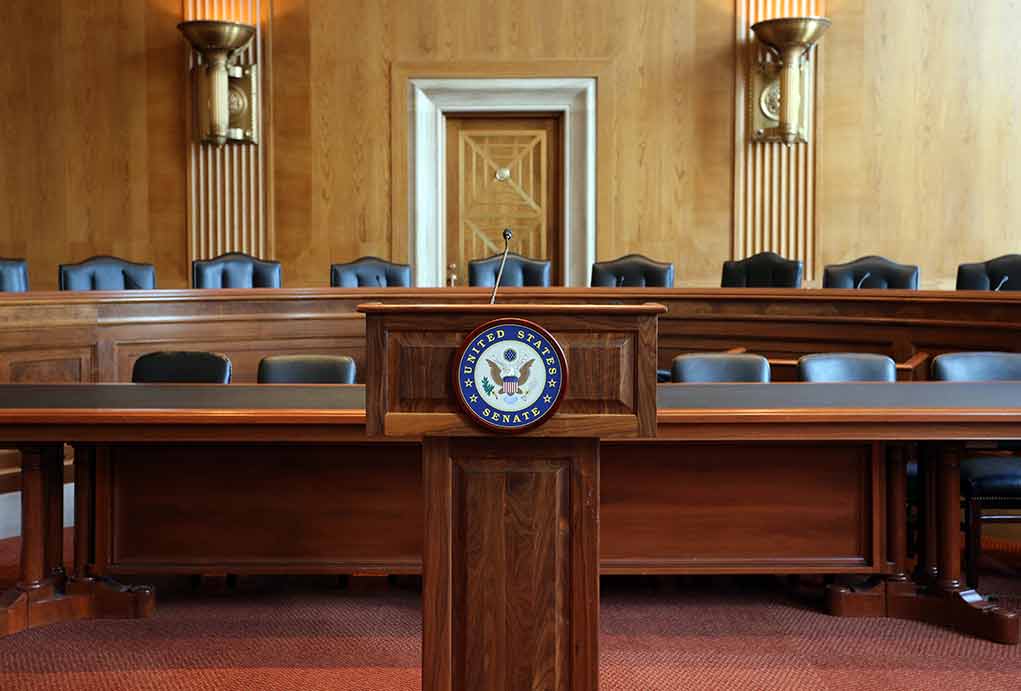
In a remarkable rebuke to President Trump’s executive power, four Senate Republicans joined Democrats to block tariffs on Canadian imports, defying the White House’s declaration of fentanyl smuggling as a national emergency.
Key Takeaways
- The Senate passed a resolution with a 51-48 vote to block President Trump’s tariffs on Canadian imports, sponsored by Senators Tim Kaine (D-Va.) and Rand Paul (R-Ky).
- Four key Republican senators broke ranks to support the measure: Mitch McConnell (R-Ky.), Susan Collins (R-Maine), Lisa Murkowski (R-Alaska), and Rand Paul (R-Ky).
- The resolution aims to terminate the national emergency declaration on fentanyl, which Trump used to justify the tariffs, though most fentanyl enters through the southern border, not Canada.
- Despite passing the Senate, the resolution faces obstacles in the Republican-controlled House and would likely be vetoed by President Trump, who has already declared he “will never sign it.”
- The vote represents what Politico called “the most significant rebuke to Trump that congressional Republicans have yet mustered in his second term.”
Republican Defections Highlight Deepening Trade Policy Divide
The Senate’s 51-48 vote to block President Trump’s proposed tariffs on Canadian imports marks a rare moment of bipartisan opposition to the president’s trade policies. Led by an unlikely alliance between Senators Rand Paul (R-Ky.) and Tim Kaine (D-Va.), the resolution directly challenges Trump’s use of emergency powers to impose tariffs on one of America’s closest allies. Most notably, Senate Minority Leader Mitch McConnell broke with Trump to support the measure, along with moderate Republicans Susan Collins and Lisa Murkowski, signaling significant discomfort within the GOP about the economic implications of these tariffs.
Senator Rand Paul, the resolution’s Republican co-sponsor, delivered a passionate defense of free trade and questioned the constitutional authority of the president to unilaterally impose what he considers taxes. “We’re not at war with Canada. They’re an ally that buys more of our stuff than almost any other country in the world,” Paul argued on the Senate floor, rejecting the administration’s justification for the emergency declaration. Constitutional conservatives within the party have long maintained that tariff authority properly belongs to Congress, not the executive branch.
Nobody was explaining the Senate resolution to block the national emergency declaration. It would be only symbolic without the House and a Veto-proof majority. So it sounds like tariffs will proceed.https://t.co/l1NIiSEVTL
— Warren Togami (@wtogami) April 2, 2025
Fentanyl Emergency Declaration Questioned
At the heart of this dispute is President Trump’s use of a national emergency declaration regarding fentanyl smuggling to justify tariffs on Canada. However, multiple senators challenged the factual basis for this declaration during debate. Susan Collins of Maine directly contradicted the administration’s narrative, stating, “The fact is the vast majority of fentanyl in America comes from the southern border.” This disconnect between the stated emergency and the proposed solution has fueled skepticism about the true motivations behind the tariff policy, with critics suggesting it’s more about economic leverage than addressing the drug crisis.
“The price hikes that will happen for Maine families, every time they go to the grocery store, they fill their gas tank, they fill their heating oil tank, if these tariffs go into effect, will be so harmful. And as price hikes always do, they will hurt those the most who can afford them the least,” Susan Collins said.
President Trump has vigorously defended his tariff policy, claiming on social media that the Senate resolution represents a “wild and flagrant push to not penalize Canada for the sale, into our Country, of large amounts of Fentanyl.” Trump characterized the vote as “devastating for the Republican Party” and promised to veto the resolution if it reaches his desk. This defense, however, has been undermined by border security data showing minimal fentanyl trafficking from the Canadian border compared to Mexican routes.
Symbolic Victory With Limited Practical Impact
Despite the Senate’s approval, the resolution faces significant hurdles before it could take effect. The Republican-controlled House is unlikely to pass the measure, particularly after Trump’s strong condemnation. Even if it were to pass, President Trump has unequivocally stated he “will never sign it.” Senator Paul acknowledged these realities, describing the vote as “an acknowledgement” of congressional authority rather than an action likely to change policy outcomes. The resolution nonetheless represents a significant moment of institutional resistance to executive overreach.
“Tariffs will hurt our families. Canada is not an enemy. Let’s not label an ally as an enemy. Let’s not impose punishing costs on American families at a time they can’t afford it. Let’s not hurt American small businesses. Let’s not make our national security investments in ships and subs more expensive,” Tim Kaine said.
The broader economic implications of Trump’s tariff policies remain a contentious issue. Economists have warned that widespread tariffs could lead to economic contraction, higher prices for consumers, and potential retaliation from trading partners. Senator Paul described the administration’s approach as “trickery and chicanery” and criticized the potential impact on American families already struggling with inflation. While Trump maintains these measures are necessary to protect American industries and security interests, the bipartisan Senate vote suggests growing concern about the economic costs of his trade agenda.
Sources:
- The Senate just passed Rand Paul’s bill to block Trump’s tariffs on Canada
- Snubbing Trump, bipartisan group of senators votes against Canada tariffs
- Republicans join Democrats in Senate vote to rescind Trump Canada tariffs | US politics | The Guardian
- Senate passes bipartisan resolution to try to block Trump’s Canada tariffs

